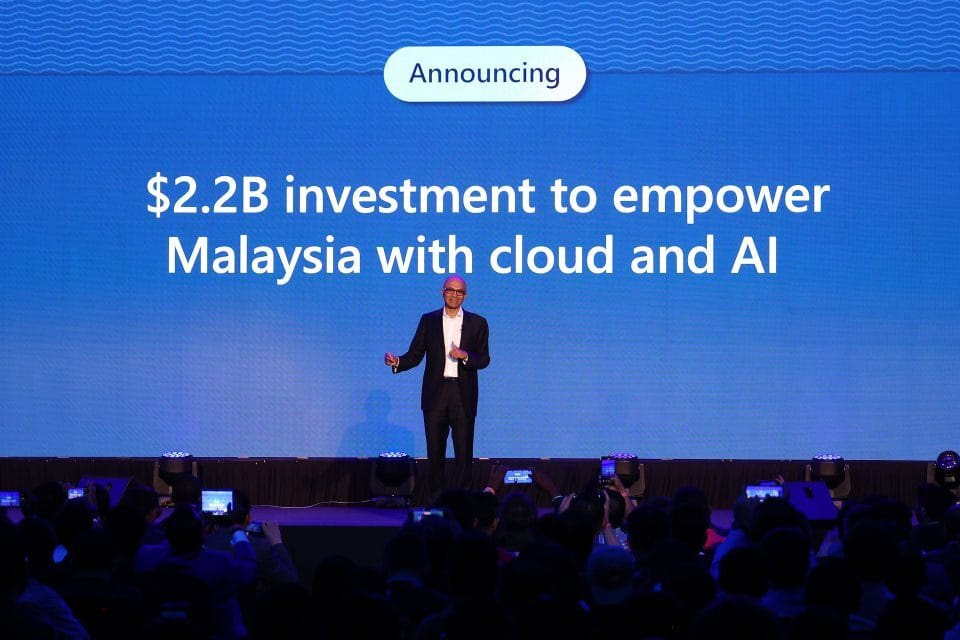There’s a jolly, bespectacled fellow who flies around the world each year delivering gifts. His name is Satya, he’s the CEO of the world’s most valuable company (Microsoft), and he wraps his Southeast Asia tour today (Thursday).
At each stop (Indonesia, Thailand, Malaysia), he’s met the national leader and made some big announcements, including new “AI infrastructure” (a 2024 way of saying ‘data centres’), plus tech-skilling and support for local developers.
His investments are in the billions, while the trainee numbers are in the millions. And these big numbers come after similar recent visits to Southeast Asia by Apple CEO Tim Cook, and Nvidia CEO Jensen Huang.
Stay on top of your world from inside your inbox.
Subscribe for free today and receive way much more insights.
Trusted by 99,000+ subscribers
No spam. No noise. Unsubscribe any time.
The press releases all preach partnership, but each player really has its own interests here, so let’s dig into what’s going on.
What’s in it for Big Tech?
It comes down to three things: revenue, talent, and risk.
On the first two (revenue and talent), these are large, young, fast-growing, and tech-savvy populations. So getting these ecosystems credentialed on Microsoft products will deliver decades of returns, plus a pipeline of skilled tech workers.
As for risk? Amidst US-China competition, the People’s Republic is fading as a viable (let alone attractive) market and manufacturing base for US tech.
So the race is on elsewhere, with US and China-based giants already facing off in emerging regions like Southeast Asia. They’re racing to secure data, meet demand, and make friends, just as new leaders and cabinets take the reins, and the AI race heats up.
What’s in it for Southeast Asia?
Again, it comes down to three things: employment, investment, and politics.
Credentialing 2.5 million young folks will help curb the region’s youth unemployment, particularly in Indonesia (13%). And this’ll help keep younger folks out of mischief, maintain momentum on living standards, slow any brain drain, and accelerate the region’s shift from tech consumption to production.
On investment, Southeast Asia is already feeling the effects of mounting debt plus a slowdown in China’s signature Belt and Road Initiative, so these Big Tech announcements fill a gap.
And on politics, you might notice how each Microsoft announcement plays enthusiastically to each national leader’s signature vision, whether it’s Indonesia’s ‘Golden 2045‘ vision, or the Thai prime minister’s ‘Ignite Thailand’.
Also, look at how each national leader has nudged Microsoft to locate the new investments around signature projects, whether it’s in the new capital that Indonesia is carving out of the jungle, or Thailand’s vast ‘eastern economic corridor’.
And again, Satya has dutifully nodded along, while also building ties with key long-term players like Indonesia’s Luhut Panjaitan, an influential cabinet minister.
And finally, why AI?
First, because AI, right? But second, there’s an expectation that AI, like other tech waves before it, will be winner-takes-all. And that’s a motivation for Microsoft as a tech competitor that just posted a 20% AI-driven profit spike. But it’s also a motivation for both the West and Southeast Asia as players in a contested world.
INTRIGUE’S TAKE
The West has learned some tough lessons during recent tech transitions, particularly the way China’s Huawei exposed Western nudity when the 5G wave crashed, offering fast and cheap connectivity across the emerging world.
But unlike in China, where the government can quarterback its private sector, Western firms shape their own international strategy (or lack thereof). So while Western diplomats have long been saying “we need to do more in Southeast Asia“, many Western firms have effectively been answering with “cool tweet, thanks“. But the rotating cast of CEOs now rolling deep across Southeast Asia suggests this is changing.
And for folks in Southeast Asia, that’s a head-turning change from the 1990s, when Big Tech only ever visited to complain about pirated Windows 95 CDs.
Also worth noting:
- Microsoft announced a similar $2.9B investment in Japan last month, plus an unusual AI investment in the UAE. It announced its first data centre in Malaysia back in 2021.
- Microsoft’s data centre in Singapore has long been running at or near capacity, and Singapore placed a moratorium on new capacity in 2019 on environmental grounds. It loosened that ban last year.
- Indonesia announced (🇮🇩) last month that US-based AI chip pioneer Nvidia is building a $200M AI centre in the country.
- Around 3.1 million Indonesians are already active on GitHub, the Microsoft-owned platform for software development.







